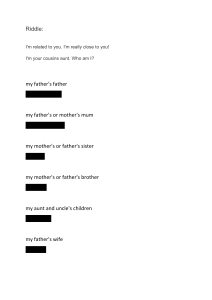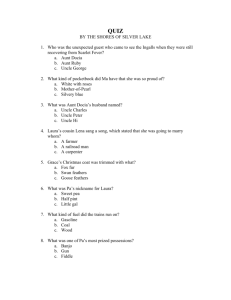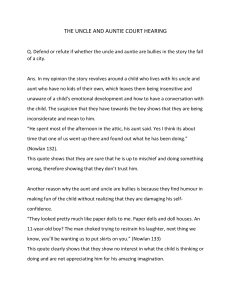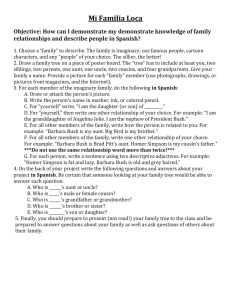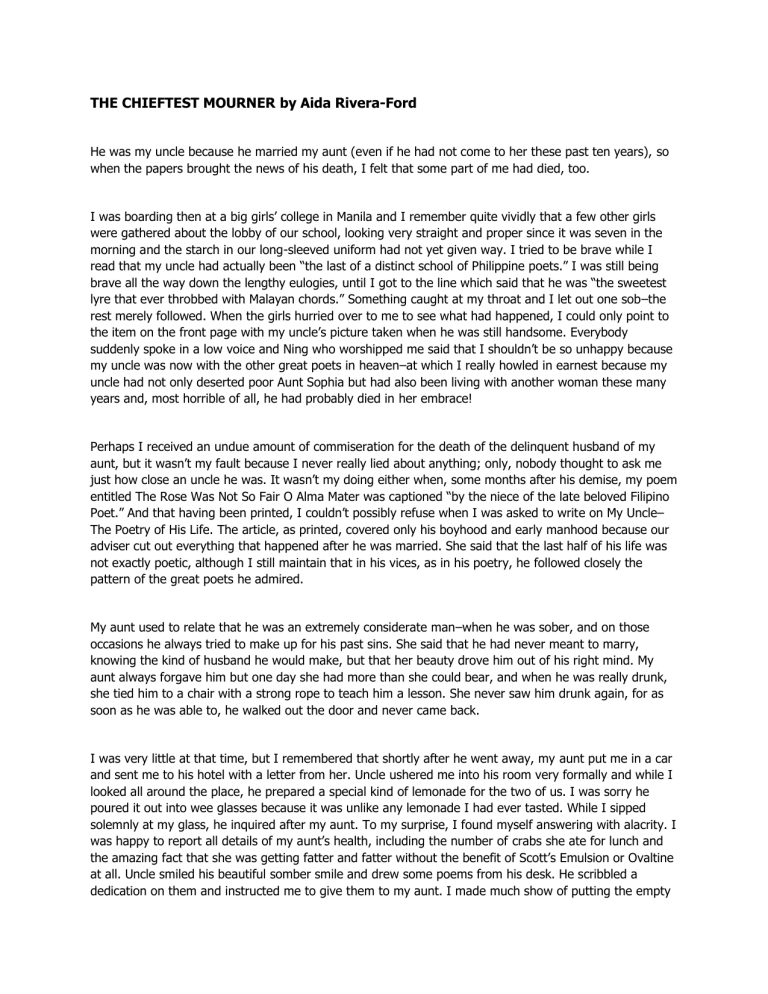
THE CHIEFTEST MOURNER by Aida Rivera-Ford He was my uncle because he married my aunt (even if he had not come to her these past ten years), so when the papers brought the news of his death, I felt that some part of me had died, too. I was boarding then at a big girls’ college in Manila and I remember quite vividly that a few other girls were gathered about the lobby of our school, looking very straight and proper since it was seven in the morning and the starch in our long-sleeved uniform had not yet given way. I tried to be brave while I read that my uncle had actually been “the last of a distinct school of Philippine poets.” I was still being brave all the way down the lengthy eulogies, until I got to the line which said that he was “the sweetest lyre that ever throbbed with Malayan chords.” Something caught at my throat and I let out one sob–the rest merely followed. When the girls hurried over to me to see what had happened, I could only point to the item on the front page with my uncle’s picture taken when he was still handsome. Everybody suddenly spoke in a low voice and Ning who worshipped me said that I shouldn’t be so unhappy because my uncle was now with the other great poets in heaven–at which I really howled in earnest because my uncle had not only deserted poor Aunt Sophia but had also been living with another woman these many years and, most horrible of all, he had probably died in her embrace! Perhaps I received an undue amount of commiseration for the death of the delinquent husband of my aunt, but it wasn’t my fault because I never really lied about anything; only, nobody thought to ask me just how close an uncle he was. It wasn’t my doing either when, some months after his demise, my poem entitled The Rose Was Not So Fair O Alma Mater was captioned “by the niece of the late beloved Filipino Poet.” And that having been printed, I couldn’t possibly refuse when I was asked to write on My Uncle– The Poetry of His Life. The article, as printed, covered only his boyhood and early manhood because our adviser cut out everything that happened after he was married. She said that the last half of his life was not exactly poetic, although I still maintain that in his vices, as in his poetry, he followed closely the pattern of the great poets he admired. My aunt used to relate that he was an extremely considerate man–when he was sober, and on those occasions he always tried to make up for his past sins. She said that he had never meant to marry, knowing the kind of husband he would make, but that her beauty drove him out of his right mind. My aunt always forgave him but one day she had more than she could bear, and when he was really drunk, she tied him to a chair with a strong rope to teach him a lesson. She never saw him drunk again, for as soon as he was able to, he walked out the door and never came back. I was very little at that time, but I remembered that shortly after he went away, my aunt put me in a car and sent me to his hotel with a letter from her. Uncle ushered me into his room very formally and while I looked all around the place, he prepared a special kind of lemonade for the two of us. I was sorry he poured it out into wee glasses because it was unlike any lemonade I had ever tasted. While I sipped solemnly at my glass, he inquired after my aunt. To my surprise, I found myself answering with alacrity. I was happy to report all details of my aunt’s health, including the number of crabs she ate for lunch and the amazing fact that she was getting fatter and fatter without the benefit of Scott’s Emulsion or Ovaltine at all. Uncle smiled his beautiful somber smile and drew some poems from his desk. He scribbled a dedication on them and instructed me to give them to my aunt. I made much show of putting the empty glass down but Uncle was dense to the hint. At the door, however, he told me that I could have some lemonade every time I came to visit him. Aunt Sophia was so pleased with the poems that she kissed me. And then all of a sudden she looked at me queerly and made a most peculiar request of me. She asked me to say ha-ha, and when I said ha-ha, she took me to the sink and began to wash the inside of my mouth with soap and water while calling upon a dozen of the saints to witness the act. I never got a taste of Uncle’s lemonade. It began to be a habit with Aunt Sophia to drop in for a periodic recital of woe to which Mama was a sympathetic audience. The topic of the conversation was always the latest low on Uncle’s state of misery. It gave Aunt Sophia profound satisfaction to relay the report of friends on the number of creases on Uncle’s shirt or the appalling decrease in his weight. To her, the fact that Uncle was getting thinner proved conclusively that he was suffering as a result of the separation. It looked as if Uncle would not be able to hold much longer, the way he was reported to be thinner each time, because Uncle didn’t have much weight to start with. The paradox of the situation, however, was that Aunt Sophia was now crowding Mama off the sofa and yet she wasn’t looking very happy either. When I was about eleven, there began to be a difference. Everytime I came into the room when Mama and Aunt Sophia were holding conference, the talk would suddenly be switched to Spanish. It was about this time that I took an interest in the Spanish taught in school. It was also at this time that Aunt Sophia exclaimed over my industry at the piano–which stood a short distance from the sofa. At first I couldn’t gather much except that Uncle was not any more the main topic. It was a woman by the name of Esa–or so I thought she was called. Later I began to appreciate the subtlety of the Spanish la mujer esa. And so I learned about the woman. She was young, accomplished, a woman of means. (A surprising number of connotations were attached to these terms.) Aunt Sophia, being a loyal wife, grieved that Uncle should have been ensnared by such a woman, thinking not so much of herself but of his career. Knowing him so well, she was positive that he was unhappier than ever, for that horrid woman never allowed him to have his own way; she even denied him those little drinks which he took merely to aid him into poetic composition. Because the woman brazenly followed Uncle everywhere, calling herself his wife, a confusing situation ensued. When people mentioned Uncle’s wife, there was no way of knowing whether they referred to my aunt or to the woman. After a while a system was worked out by the mutual friends of the different parties. No. 1 came to stand for Aunt Sophia and No. 2 for the woman. I hadn’t seen Uncle since the episode of the lemonade, but one day in school all the girls were asked to come down to the lecture room–Uncle was to read some of his poems! Up in my room, I stopped to fasten a pink ribbon to my hair thinking the while how I would play my role to perfection–for the dear niece was to be presented to the uncle she had not seen for so long. My musings were interrupted, however, when a girl came up and excitedly bubbled that she had seen my uncle–and my aunt, who was surprisingly young and so very modern! I couldn’t go down after all; I was indisposed. Complicated as the situation was when Uncle was alive, it became more so when he died. I was puzzling over who was to be the official widow at his funeral when word came that I was to keep Aunt Sophia company at the little chapel where the service would be held. I concluded with relief that No. 2 had decamped. The morning wasn’t far gone when I arrived at the chapel and there were only a few people present. Aunt Sophia was sitting in one of the front pews at the right section of the chapel. She had on a black and white print which managed to display its full yardage over the seat. Across the aisle from her was a very slight woman in her early thirties who was dressed in a dramatic black outfit with a heavy veil coming up to her forehead. Something about her made me suddenly aware that Aunt Sophia’s bag looked paunchy and worn at the corners. I wanted to ask my aunt who she was but after embracing me when I arrived, she kept her eyes stolidly fixed before her. I directed my gaze in the same direction. At the front was the president’s immense wreath leaning heavily backward, like that personage himself; and a pace behind, as though in deference to it, were other wreaths arranged according to the rank and prominence of the people who had sent them. I suppose protocol had something to do with it. I tiptoed over to the muse before Uncle as he lay in the dignity of death, the faintest trace of his somber smile still on his face. My eyes fell upon a cluster of white flowers placed at the foot of the casket. It was ingeniously fashioned in the shape of a dove and it bore the inscription “From the Loyal One.” I looked at Aunt Sophia and didn’t see anything dove-like about her. I looked at the slight woman in black and knew of a sudden that she was the woman. A young man, obviously a brother or a nephew, was bending over her solicitously. I took no notice of him even though he had elegant manners, a mischievous cowlick, wistful eyes, a Dennis Morgan chin, and a pin which testified that he belonged to what we girls called our “brother college.” I showed him that he absolutely did not exist for me, especially when I caught him looking in our direction. I always feel guilty of sacrilege everytime I think of it, but there was something grimly ludicrous about my uncle’s funeral. There were two women, each taking possession of her portion of the chapel just as though stakes had been laid, seemingly unmindful of each other, yet revealing by this studied disregard that each was very much aware of the other. As though to give balance to the scene, the young man stood his full height near the woman to offset the collective bulk of Aunt Sophia and myself, although I was merely a disproportionate shadow behind her. The friends of the poet began to come. They paused a long time at the door, surveying the scene before they marched self-consciously towards the casket. Another pause there, and then they wrenched themselves from the spot and moved–no, slithered–either towards my aunt or towards the woman. The choice must have been difficult when they knew both. The women almost invariably came to talk to my aunt whereas most of the men turned to the woman at the left. I recognized some important Malacañang men and some writers from seeing their pictures in the papers. Later in the morning a horde of black-clad women, the sisters and cousins of the poet, swept into the chapel and came directly to where my aunt sat. They had the same deep eye-sockets and hollow cheek-bones which had lent a sensitive expression to the poet’s face but which on them suggested t.b. The air became dense with the sickly-sweet smell of many flowers clashing and I went over to get my breath of air. As I glanced back, I had a crazy surrealist impression of mouths opening and closing into Aunt Sophia’s ear, and eyes darting toward the woman at the left. Uncle’s clan certainly made short work of my aunt for when I returned, she was sobbing. As though to comfort her, one of the women said, in a whisper which I heard from the door, that the president himself was expected to come in the afternoon. Toward lunchtime, it became obvious that neither my aunt nor the woman wished to leave ahead of the other. I could appreciate my aunt’s delicadeza in this matter but then got hungry and therefore grew resourceful: I called a taxi and told her it was at the door with the meter on. Aunt Sophia’s unwillingness lasted as long as forty centavos. We made up for leaving ahead of the woman by getting back to the chapel early. For a long time she did not come and when Uncle’s kinswomen arrived, I thought their faces showed a little disappointment at finding the left side of the chapel empty. Aunt Sophia, on the other hand, looked relieved. But at about three, the woman arrived and I perceived at once that there was a difference in her appearance. She wore the same black dress but her thick hair was now carefully swept into a regal coil; her skin glowing; her eyes, which had been striking enough, looked even larger. The eyebrows of the women around me started working and finally, the scrawniest of the poet’s relations whispered to the others and slowly, together, they closed in on the woman. I went over to sit with my aunt who was gazing not so steadily at nothing in particular. At first the women spoke in whispers, and then the voices rose a trifle. Still, everybody was polite. There was more talking back and forth, and suddenly the conversation wasn’t polite any more. The only good thing about it was that now I could hear everything distinctly. “So you want to put me in a corner, do you? You think perhaps you can bully me out of here?” the woman said. “Shh! Please don’t create a scene,” the poet’s sisters said, going one pitch higher.” It’s you who are creating a scene. Didn’t you come here purposely to start one?” “We’re only trying to make you see reason…. If you think of the dead at all…” “Let’s see who has the reason. I understand that you want me to leave, isn’t it? Now that he is dead and cannot speak for me you think I should quietly hide in a corner?” The woman’s voice was now pitched up for the benefit of the whole chapel. “Let me ask you. During the war when the poet was hard up do you suppose I deserted him? Whose jewels do you think we sold when he did not make money… When he was ill, who was it who stayed at his side… Who took care of him during all those months… and who peddled his books and poems to the publishers so that he could pay for the hospital and doctor’s bills? Did any of you come to him then? Let me ask you that! Now that he is dead you want me to leave his side so that you and that vieja can have the honors and have your picture taken with the president. That’s what you want, isn’t it–to pose with the president….” “Por Dios! Make her stop it–somebody stop her mouth!” cried Aunt Sophia, her eyes going up to heaven. “Now you listen, you scandalous woman,” one of the clan said, taking it up for Aunt Sophia. “We don’t care for the honors–we don’t want it for ourselves. But we want the poet to be honored in death… to have a decent and respectable funeral without scandal… and the least you can do is to leave him in peace as he lies there….” “Yes,” the scrawny one said. “You’ve created enough scandal for him in life–that’s why we couldn’t go to him when he was sick… because you were there, you–you shameless bitch. “The woman’s face went livid with shock and rage. She stood wordless while her young protector, his eyes blazing, came between her and the poet’s kinswomen. Her face began to twitch. And then the sobs came. Big noisy sobs that shook her body and spilled the tears down her carefully made-up face. Fitfully, desperately, she tugged at her eyes and nose with her widow’s veil. The young man took hold of her shoulders gently to lead her away, but she shook free; and in a few quick steps she was there before the casket, looking down upon that infinitely sad smile on Uncle’s face. It may have been a second that she stood there, but it seemed like a long time. “All right,” she blurted, turning about. “All right. You can have him–all that’s left of him!“ At that moment before she fled, I saw what I had waited to see. The mascara had indeed run down her cheeks. But somehow it wasn’t funny at all. Source: https://philippinelit.wordpress.com/2013/03/26/the-chieftest-mourner-by-aida-riveraford/#more-30
